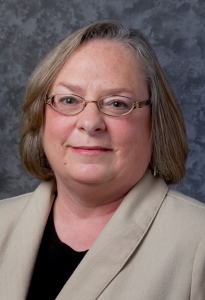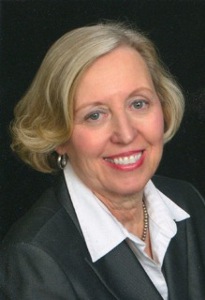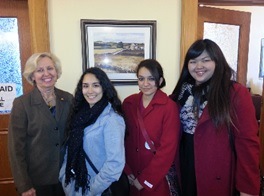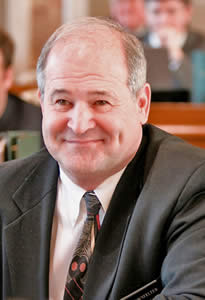
This past week it was a pleasure to have three students, Daniel, Zel and Daniel, from Bethel Neighborhood Center serve as pages. The students did a great job running errands for legislators and were very attentive during a long floor debate.
Monday, March 16, marks day 60 of the Kansas Legislature’s 90-day session. Last week the House of Representatives narrowly passed House Substitute for Senate Bill 7 that fundamentally changes the way public education is funded in Kansas. I voted no on this bill. The bill eliminates the school finance formula, and allocates in its place the Governor’s block grant program for 2016 and 2017. I will continue to stand up and fight for public education in Topeka. Please talk to your family, your friends, and your neighbors about the importance of education to the future of our children, our state, and our economy.
It remains an incredible honor to represent our community in the Kansas House of Representatives. While the Legislature is in Session, I do my best to stay in touch and keep you informed by email, and I spend countless hours every week helping my constituents solve problems. If I can be of service to you or anyone you know please call my office at 785-296-7371 or email me at [email protected]
Block grants
After just one week of debate, on a vote of 64-57, the Kansas House of Representatives passed the largest education reform in over twenty years. House Substitute for Senate Bill 7 eliminates the school finance formula, and allocates in its place the Governor’s block grant program for 2016 and 2017.
I voted against the legislation because I consider educating our children to be one of the most important things state government does. The bill, which was unnecessarily fast tracked in the House, does not meet the needs of Kansas schools districts because it:
Eliminates the current education formula
The block grant formula eliminates the weightings to account for growing or shrinking enrollment, at-risk and bi-lingual students, high transportation costs, career and vocational-technical programs, among others. The current formula must meet the needs of almost 300 different school districts in our state, each with their own set of unique challenges. The problem with the funding formula was not that it was broken, but that it wasn’t fully funded.
Decreases education funding
The Governor’s education plan does nothing to address the issue that our schools have been perpetually underfunded for more than five years. The plan freezes funding for two consecutive years at current levels, forcing school districts to absorb the cost. According to the Kansas Department of Education, our district alone would lose more than $XX dollars, a cut our schools cannot afford.
Creates inequalities among districts
This legislation pits poor districts against wealthy districts and rural districts against urban districts. Students in Kansas City will not have access to the same resources as students in Johnson County. That is unfair to Kansas schools and bad for the Kansas economy.
The bill will now go to the Senate for final approval on Monday, and then to the governor’s desk for signature. I urge you to contact the Governor’s Office at 785-368-8500 and ask him to veto the bill. It is time for Kansas to make fair and adequate funding a priority. Our children, the future of Kansas, deserve better.
Budget overview
Despite the legislature being in session for over two months now, we have yet to see a comprehensive budget bill that addresses the $600 million deficit that was created by the Governor’s failed economic experiment. In the coming weeks, however, the budget will again become a priority as we are confronted with difficult decisions about the future of our state. As the budget process moves forward, I will consider any sustainable plan that is fair and equitable for Kansas families.
Repeal of exemption would raise property taxes
In an effort to fill the projected $600 million budget hole, the Senate Assessment and Taxation Committee heard a bill that would reinstate $45 million in property taxes on Kansas homeowners. The bill would repeal a statewide exemption of the first $20,000 of the appraised value of residential property.
The tax, which is regressive in nature, is uniformly applied to all Kansas homeowners regardless of the cost of their home. Lower income Kansans will be forced to pay a larger portion of their annual income than their wealthier counterparts. This is yet another example of how the poorest Kansans are being forced to bear the cost of the Governor’s failed economic experiment.
Changes to TANF/SNAP
The House Commerce, Labor and Economic Committee approved a bill this week that changes the way two social service programs, Temporary Assistance for Needy Families (TANF) and Supplemental Nutrition Assistance Program (SNAP), are administered by the state. There are numerous changes to the programs, but some of the most concerning include:
-Prohibiting the use of federal or state funds to promote and assist enrollment
-Reducing the lifetime limit on TANF benefits from 48 months to 36 months
-Restricting eligibility for citizens with previous drug offenses.
The proposed changes will make TANF and SNAP less accessible for Kansans who need assistance during a time when poverty in Kansas is increasing. This places additional burden on people willing to work hard and play by the rules, but sometimes need a little help.
Renewable Portfolio Standards ‘RPS’
A measure to sunset the state’s Renewable Portfolio Standard at the end of 2015 was heard in committees of both chambers this week. Passed in 2009, the Renewable Portfolio Standard (RPS) requires major electrical companies to harvest ten percent of their energy from renewable sources. Under the 2009 legislation that percentage is scheduled to grow to fifteen percent in 2016, and twenty percent in 2020.
If the legislature repeals RPS, the minimum industry standards for renewable energy sources will be eliminated. Those in favor of keeping RPS argue it is essential to the continued success of Kansas’ alternative energy markets – in particular wind energy, which accounts for over 13,000 jobs in Kansas.
Fantasy Football
Fantasy Football fans in Kansas may soon have something to cheer about. According to the Racing and Gaming Commission, Fantasy Football Leagues that disburse money as awards are considered lotteries and are therefore illegal under Kansas law. A bill in the House makes participation in Fantasy Leagues legal by changing their designation from a lottery to a game of skill.
Changes to conceal and carry laws
A hearing was held in the Senate on a bill that would abolish Kansas’ permit requirement to conceal and carry a fireman. Current state law requires individuals to submit an application, complete firearm safety training courses, and pass a background screening. The measure in the Kansas Senate would remove all existing requirements and will make it legal for almost anyone to conceal and carry without a permit.
Medicaid expansion
The House Health and Human Services Committee will hold hearings on March 18 & 19 on a bill that would extend coverage to more Kansans through Medicaid expansion. Expanding health care coverage would help lower uncompensated care. A healthy workforce is more productive and leads to a growing state economy, more local jobs and more spending.





